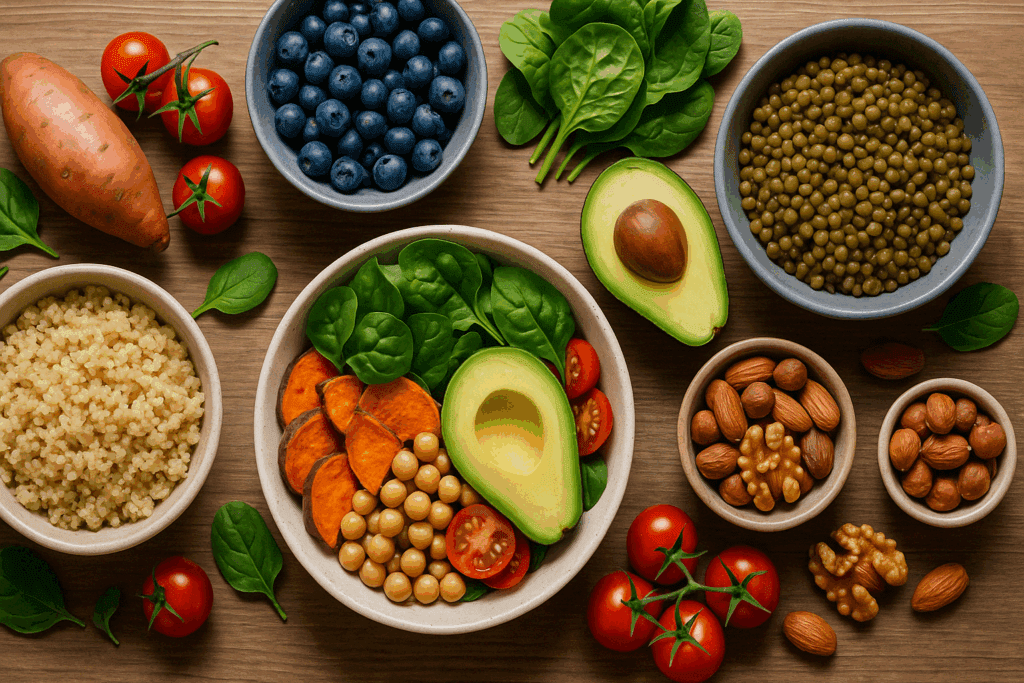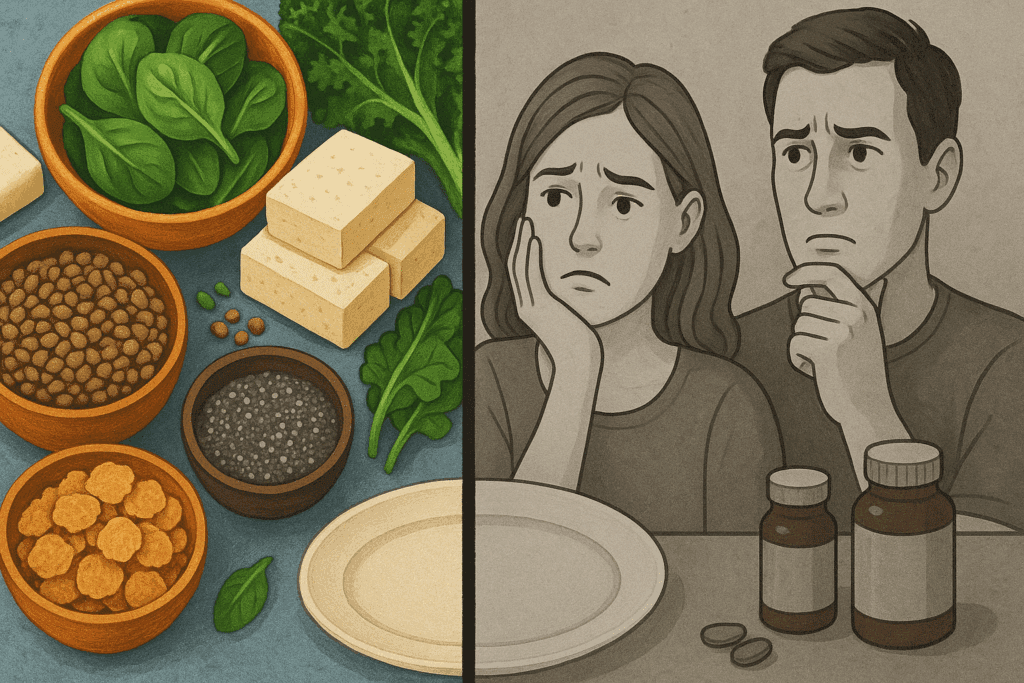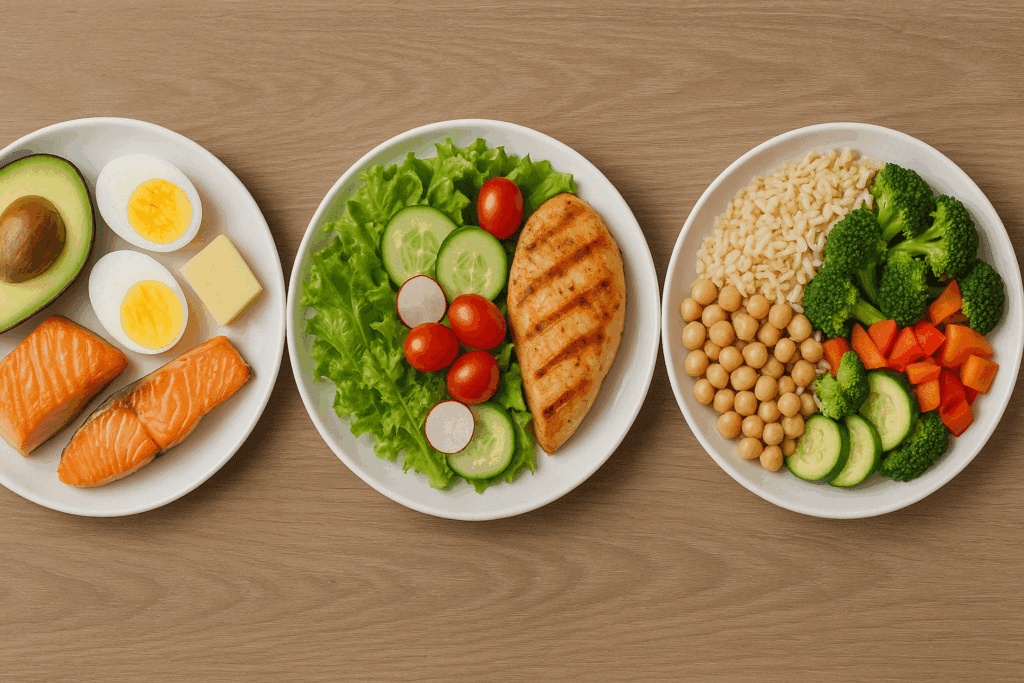Adopting a vegetarian lifestyle can be a deeply personal decision, often rooted in health, environmental ethics, or a desire to align food choices with personal values. But as more people gravitate toward plant-based living, it’s essential to examine the vegetarian diet pros and cons through a science-based lens. With insights grounded in medical evidence and dietary research, this article explores the advantages of being vegetarian while also candidly addressing the potential negatives of a vegetarian diet. By weighing the full spectrum of impacts—physiological, nutritional, and practical—we aim to provide a well-rounded analysis that empowers individuals to make informed dietary choices.
You may also like: Plant Based Diet vs Standard American Diet: What the Latest Studies Reveal About Long-Term Health Outcomes
Understanding the Foundations of Vegetarianism
Before unpacking the pros and cons of vegetarianism, it’s important to understand what the diet entails. A vegetarian diet excludes meat, poultry, and fish but often includes dairy and eggs (lacto-ovo vegetarian). Some choose stricter forms, such as veganism, which eliminates all animal products. Despite differences in adherence, vegetarian diets share a focus on fruits, vegetables, whole grains, legumes, nuts, and seeds. These foods form the backbone of whole-food plant-based nutrition, a pattern closely linked with long-term health benefits.
Numerous medical organizations, including the Academy of Nutrition and Dietetics, recognize well-planned vegetarian and vegan diets as nutritionally adequate and beneficial for the prevention and treatment of certain chronic diseases. Yet, dietary quality and balance are crucial. A poorly planned vegetarian diet can lead to nutritional gaps, underscoring the importance of both experience and expertise in making sustainable, health-promoting dietary decisions.

Health Benefits of a Vegetarian Diet: Evidence-Based Advantages
One of the most compelling reasons individuals turn to a vegetarian lifestyle is the potential for improved health outcomes. Scientific literature consistently supports the advantages of being vegetarian, particularly when the diet emphasizes whole foods over processed vegetarian substitutes. Studies show that vegetarians often have lower body mass index (BMI), reduced risk of ischemic heart disease, and lower blood pressure compared to their omnivorous counterparts.
The fiber-rich nature of plant-based diets plays a crucial role in promoting digestive health and regulating blood sugar levels. Plant foods are also naturally free of cholesterol and tend to be lower in saturated fat, both of which are beneficial for cardiovascular health. Additionally, phytochemicals, antioxidants, and polyphenols found in vegetables, fruits, and legumes contribute to lower systemic inflammation and may offer protective effects against certain types of cancer.
Moreover, vegetarians are less likely to develop type 2 diabetes and tend to exhibit better insulin sensitivity. These benefits are not limited to vegan diets; even lacto-ovo vegetarian diets can yield significant health improvements, especially when they are based on whole-food plant-based nutrition principles.
Nutritional Concerns and the Potential Negatives of a Vegetarian Diet
While the benefits are considerable, it’s equally important to recognize the potential drawbacks. The negatives of a vegetarian diet often stem from nutritional deficiencies, particularly when the diet is not carefully balanced. Vitamin B12, iron, zinc, omega-3 fatty acids, and protein are among the nutrients that may be lacking without thoughtful meal planning.
Vitamin B12, primarily found in animal products, is crucial for neurological function and red blood cell formation. Deficiency can lead to fatigue, memory issues, and even irreversible nerve damage. Similarly, iron from plant sources (non-heme iron) is less bioavailable than iron from meat, making vegetarians more susceptible to iron-deficiency anemia unless they consume iron-rich foods with vitamin C to enhance absorption.
Protein, often misunderstood in vegetarian diets, is not difficult to obtain with diversity. However, reliance on limited sources—like only beans or grains—can lead to an imbalance in essential amino acids. Incorporating a range of plant-based protein sources like lentils, tofu, tempeh, quinoa, and chia seeds helps overcome this.
It’s also worth noting that some critics argue vegetarian is bad for those with higher nutritional needs, such as athletes or pregnant individuals, unless the diet is managed with expert guidance. This critique doesn’t suggest the diet is inherently harmful, but it underscores the need for tailored nutritional strategies.

Practical Challenges: Social, Economic, and Behavioral Considerations
Beyond the biological implications, vegetarianism can also present practical obstacles. Eating out, attending social events, or traveling may be more complicated for vegetarians, especially in areas with limited plant-based options. This can lead to feelings of exclusion or frustration, particularly for those new to the lifestyle.
Economically, while staples like beans and rice are inexpensive, the cost of organic produce, specialty meat substitutes, and fortified foods or supplements can add up. For some, adopting a vegetarian diet may initially feel financially burdensome.
Behavioral habits also play a role. Individuals who previously relied heavily on meat-centered meals may struggle with meal planning or culinary creativity when transitioning. The success of a vegetarian lifestyle often hinges on access to resources, education, and a supportive community.
Comparing Vegetarianism with Other Dietary Trends
In the landscape of modern nutrition, vegetarianism is often compared to other popular dietary approaches—particularly low-carb and high-fat plans like keto. Understanding the ketogenic diet vs low carb eating patterns helps highlight where vegetarianism fits into the broader dietary spectrum.
The keto diet is a very low-carb, high-fat approach that aims to induce ketosis—a metabolic state where fat becomes the body’s primary fuel. Many wonder: is keto a low carb diet or something entirely different? In reality, all ketogenic diets are low-carb by definition, but not all low-carb diets are keto. This distinction matters when comparing nutritional adequacy and sustainability.
When discussing keto diet vs low carb diet strategies in the context of plant-based eating, the question arises—can one be vegetarian and keto? While possible, it’s more restrictive. Most keto vegetarians must rely on high-fat dairy, eggs, coconut oil, and nuts, limiting variety. Meanwhile, a traditional vegetarian diet offers greater flexibility and more fiber.

Critically, studies suggest that while keto diets may provide short-term weight loss benefits, they can be difficult to sustain and may lack long-term safety data. In contrast, whole-food plant-based diets offer proven benefits for weight management and metabolic health. This raises the question: is a keto diet sustainable when compared to plant-based eating? For many, the answer leans toward vegetarianism, particularly when factoring in adherence and long-term health outcomes.
Common Misconceptions: Is a Vegetarian Diet Always Healthy?
A common misconception is that all vegetarian diets are automatically healthy. However, the pros and cons of vegetarianism depend significantly on food choices. Highly processed meat substitutes, refined grains, and sugary snacks can derail the health benefits of plant-based eating.
In fact, some individuals who identify as vegetarian consume minimal fruits and vegetables, instead relying on processed foods that offer little nutritional value. In these cases, the health profile of the diet may be no better—and potentially worse—than a balanced omnivorous diet.
Thus, the advantages of being vegetarian are most apparent in those following a whole-food plant-based approach. Emphasizing unprocessed grains, legumes, vegetables, fruits, nuts, and seeds ensures nutrient density and supports overall health.
Is Vegetarianism Appropriate for Everyone?
While many thrive on a plant-based diet, it’s not universally ideal. Certain medical conditions, food intolerances, or cultural preferences may necessitate flexibility. Moreover, transitioning to a vegetarian diet may not suit everyone psychologically or socially.
Children, older adults, and pregnant individuals require particular nutritional attention. For example, growth and development depend on adequate intake of nutrients like calcium, iron, and omega-3s. In these populations, working with a registered dietitian can help meet dietary needs effectively.
Some critics go as far as to suggest vegetarian is bad for those in these categories, but such claims overlook the power of informed planning. When managed well, vegetarian diets can support all stages of life. The key lies in customization, not universal application.
Environmental and Ethical Dimensions of Vegetarianism
Beyond personal health, many people adopt a vegetarian lifestyle for environmental or ethical reasons. Livestock farming is a significant contributor to greenhouse gas emissions, water pollution, and deforestation. Shifting toward plant-based diets can dramatically reduce one’s environmental footprint.
Ethically, the decision to abstain from consuming animals often aligns with values of compassion and sustainability. These factors may not affect everyone’s daily nutrient intake, but they provide important context for understanding the broader appeal of vegetarianism.
From an environmental standpoint, reducing meat consumption is one of the most impactful individual actions. Even modest dietary changes—such as adopting a flexitarian approach—can make a difference. This context adds weight to the advantages of being vegetarian, extending their relevance beyond personal health.
The Role of Supplementation and Fortified Foods
Given the potential for nutritional gaps, supplementation is a common consideration for vegetarians. Vitamin B12 is the most critical supplement, as it is virtually absent from plant foods. Others may include vitamin D, omega-3s from algae, iodine, and iron.
Fortified plant-based milks, cereals, and nutritional yeast can also help meet nutrient targets. The goal isn’t to mimic an omnivorous diet but to ensure nutritional adequacy in a plant-based context. When approached with knowledge and intention, supplementation can transform the potential negatives of a vegetarian diet into manageable aspects of a thriving lifestyle.

Frequently Asked Questions: Vegetarian Diet Pros and Cons
1. Can a vegetarian switch to a Mediterranean diet without losing plant-based benefits?
Yes, a vegetarian can transition into a Mediterranean diet while maintaining many plant-based healthbenefits. The Mediterranean diet emphasizes whole foods like fruits, vegetables, legumes, and whole grains—components already central to vegetarian meals. By integrating healthy Mediterranean meals that incorporate olive oil, nuts, and legumes, vegetarians can expand their palate while enhancing heart health. Many Mediterranean diet menu ideas also include vegetarian-friendly dishes like lentil soups, roasted vegetable platters, and chickpea-based stews. This overlap allows for a smooth dietary transition, offering a new world of flavor while staying committed to ethical or health-driven vegetarian principles.
2. What are some practical Mediterranean diet meal ideas for vegetarians?
Vegetarians exploring Mediterranean diet ideas will find a rich variety of options beyond pasta andsalad. Think stuffed eggplants with quinoa and pine nuts, creamy white bean and rosemary soup, or grilled zucchini layered with ricotta and herbs. These healthy Mediterranean meals are often low in added sugars and high in fiber and phytonutrients. One key advantage of this approach is that it seamlessly accommodates vegetarian preferences while offering vibrant, satiating flavors. With resources like a 7 day Mediterranean meal plan or a Mediterranean diet meal plan shopping list, meal prep becomes more intuitive and enjoyable.
3. How can vegetarians incorporate Mediterranean diet lunches into their weekly routine?
One of the most convenient ways to add Mediterranean diet lunches to a vegetarian lifestyle is byprepping ahead with batch-cooked ingredients. Roasted vegetables, hummus, lentil salads, and marinated olives can serve as base components for quick, healthy Mediterranean lunches throughout the week. Consider using whole grain pitas filled with baba ganoush and arugula, or try farro bowls topped with tomato-cucumber salad and crumbled feta. Incorporating these Mediterranean diet meal ideas boosts nutrient density while minimizing the monotony often associated with packed lunches. Including at least one or two low sodium Mediterranean diet recipes per week also supports heart health and longevity.
4. Are Mediterranean diet dinners suitable for vegetarians concerned with protein intake?
Absolutely. Mediterranean diet dinners often revolve around legumes, dairy, nuts, and whole grains,all of which provide ample plant-based protein. Recipes like lentil moussaka, baked falafel with tzatziki, and grilled halloumi over barley are just a few examples of Mediterranean food that nourish the body while meeting protein needs. For those following a vegetarian diet to lose weight, these dishes offer satisfying bulk without excess calories or saturated fat. Planning med diet dinner options in advance can ensure a nutrient-rich, balanced plate every night.
5. How does the Mediterranean diet compare to vegetarianism for long-term sustainability?
When comparing these dietary styles for sustainability, many experts agree that the Mediterraneandiet is one of the most adaptable and balanced options. It allows for moderate inclusion of fish and dairy while still being rich in plant foods, making it easier to follow over the long term for many people. For vegetarians who want a bit more variety, the Mediterranean diet offers flexibility while maintaining core health principles. A 21 day Mediterranean diet menu, for instance, can provide both structure and variety, helping individuals stay engaged without sacrificing ethical or health commitments. It’s also easier to customize for different calorie levels and food preferences.
6. Can a low carb Mediterranean diet meal plan work for vegetarians?
Yes, a low carb Mediterranean diet meal plan can be adapted for vegetarians by focusing on nonstarchy vegetables, healthy fats, and protein-rich legumes or dairy. While traditional Mediterranean dishes do include bread and pasta, there are numerous low-carb alternatives that align with vegetarian choices, such as zucchini noodles, eggplant lasagna, and cauliflower-based tabbouleh. Including recipes for Mediterranean diet options that are naturally lower in carbs makes it easier to support blood sugar control and metabolic health. As always, balance is key—especially when adopting a new eating pattern.
7. What are some of the healthiest Mediterranean dishes that also support vegetarian nutrition?
Some of the healthiest Mediterranean dishes that align with vegetarian nutrition include Greek lentilsoup (fakes), white bean stew, tabbouleh with extra parsley, and baked ratatouille with olive oil and herbs. These dishes are packed with plant-based protein, antioxidants, and heart-healthy fats. Mediterranean diet dinners like these can be particularly supportive for vegetarians managing conditions like high blood pressure or cholesterol. To optimize health benefits, many vegetarians rotate in these healthiest Mediterranean dishes as part of a 7 day meal plan Mediterranean diet template tailored to their nutritional needs. Including such meals regularly encourages both variety and nutrient adequacy.
8. How do you build a Mediterranean diet meal plan shopping list as a vegetarian?
Creating a Mediterranean diet meal plan shopping list as a vegetarian starts with foundational pantrystaples: olive oil, canned legumes, whole grains, nuts, seeds, and dried herbs. From there, weekly shopping should include seasonal produce like tomatoes, leafy greens, eggplants, and bell peppers, along with yogurt and cheeses if dairy is included. Including specific Mediterranean diet meal ideas in your planning process allows for smarter shopping and better adherence to your health goals. Aim to stock ingredients for both simple meals and more complex dishes, ensuring flexibility and satisfaction throughout the week. Over time, the process becomes intuitive and can even help reduce food waste.
9. Is there a structured 7 day Mediterranean diet for weight loss that suits vegetarians?
Yes, several structured 7 day Mediterranean diet for weight loss plans are available that can becustomized for vegetarian needs. These plans often emphasize calorie control without sacrificing meal enjoyment. For instance, a sample day might include a breakfast of Greek yogurt with berries and walnuts, a lunch of roasted vegetable and quinoa salad, and a dinner of chickpea stew with a side of sautéed greens. Including Mediterranean diet lunches and dinners with strategic portions and low sodium Mediterranean diet recipes helps promote satiety and sustained energy levels. This approach avoids extremes and encourages a healthy relationship with food.
10. What are the long-term psychological benefits of combining vegetarianism with Mediterranean eating?
The psychological benefits of combining these diets often stem from improved food enjoyment,reduced stress around eating, and a greater sense of alignment with personal values. When individuals adopt a healthy Mediterranean lifestyle while retaining vegetarian ideals, they often feel less restricted and more empowered to make satisfying food choices. Examples of Mediterranean food such as lemony lentil soup or herbed mushroom risotto add culinary excitement that counters diet fatigue. Over time, following a 7 day Mediterranean meal plan or even a 21 day Mediterranean diet menu can foster confidence, mindfulness, and a deeper appreciation for food as nourishment. This mental and emotional support is often overlooked but crucial for long-term dietary adherence.

Conclusion: Weighing the Pros and Cons of a Vegetarian Lifestyle
In assessing the vegetarian diet pros and cons, one truth becomes clear: there is no one-size-fits-all answer. The benefits of vegetarianism—from reduced risk of chronic disease to improved metabolic health and a lighter environmental impact—are significant and well-supported by research. However, these advantages depend heavily on dietary quality and proper planning.
The potential negatives of a vegetarian diet, including nutritional deficiencies and social or logistical challenges, are real but surmountable. With appropriate education, expert guidance, and access to wholesome foods, these issues can be addressed successfully. In this way, the vegetarian lifestyle pros and cons are less a binary judgment and more a continuum of personal experience and adaptability.
Ultimately, whether one is exploring the pros cons of vegetarianism, questioning if vegetarian is bad for certain individuals, or simply curious about how a plant-based lifestyle compares to keto and low-carb approaches, the decision should rest on evidence, personalization, and long-term goals. Is keto a good diet? For some, perhaps. Is keto no carbs? Not quite—but it is very low in them. Yet, when viewed through the lens of sustainability and nutrient diversity, a whole-food plant-based diet offers a compelling, science-backed alternative worth considering.
Was this article helpful? Don’t let it stop with you. Share it right now with someone who needs to see it—whether it’s a friend, a colleague, or your whole network. And if staying ahead on this topic matters to you, subscribe to this publication for the most up-to-date information. You’ll get the latest insights delivered straight to you—no searching, no missing out.
Further Reading:
The Pros and Cons of Vegetarian Diets
Pros and cons of a vegetarian diet
Disclaimer
The information contained in this article is provided for general informational purposes only and is not intended to serve as medical, legal, or professional advice. While NewsHealthWatch strives to present accurate, up-to-date, and reliable content, no warranty or guarantee, expressed or implied, is made regarding the completeness, accuracy, or adequacy of the information provided. Readers are strongly advised to seek the guidance of a qualified healthcare provider or other relevant professionals before acting on any information contained in this article. NewsHealthWatch, its authors, editors, and contributors expressly disclaim any liability for any damages, losses, or consequences arising directly or indirectly from the use, interpretation, or reliance on any information presented herein. The views and opinions expressed in this article are those of the author(s) and do not necessarily reflect the official policies or positions of NewsHealthWatch.

